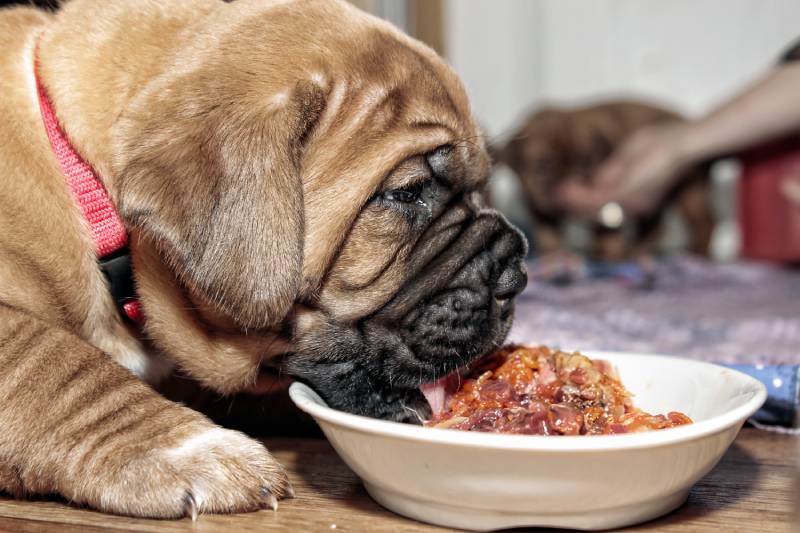Can Dogs Eat Pork? What You Need to Know!

Updated on
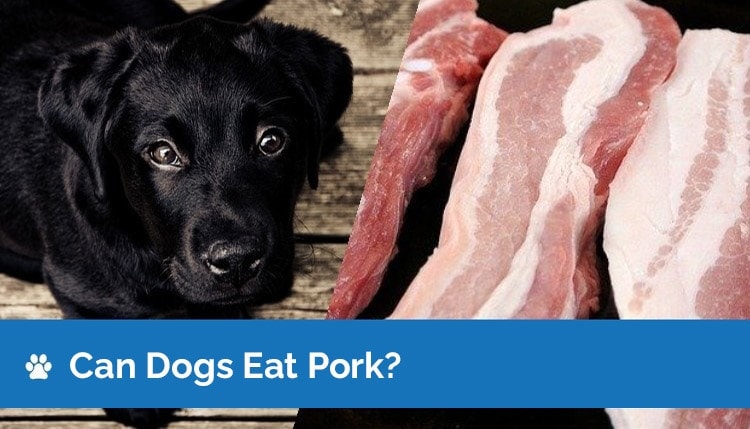
Pork is a great source of amino acids and is rich in thiamine and vitamin B12. In moderation, and assuming it is cooked properly, it is perfectly safe to feed pork to your dog. However, the pork needs to be plain and should not be overfed. Most importantly, you must ensure that it is not undercooked. Undercooked pork is as dangerous for dogs as it is for humans.
Below, we have highlighted some of the other guidelines you should follow when feeding this meat to your dog.
The Benefits
Plain pork is considered a healthy food source for your dog, in moderation. In fact, it’s a good source of animal protein, rich in amino acids and especially thiamine.
- Animal protein will help your dog build and maintain muscle. It is beneficial for puppies that are still growing but is also an important part of a daily diet for dogs of any age.
- The thiamine also converts into energy, ensuring that your dog has plenty of energy to run around and get its daily exercise. Dogs cannot naturally make thiamine, which means that they must get all their requirements from the food that they eat.
- Pork is also known to be a good source of vitamin B12. Dogs do not naturally form B12 or cobalamin. This is another vitamin that dogs cannot produce naturally, so it needs to be incorporated into their diet.
It’s also worth mentioning that pork has a strong and alluring smell. Your dog will likely find it highly palatable. It’s not just great to feed your dog a little bit of something they drool over, but foods like this can be highly beneficial when used as a treat for positive reinforcement. Or if you need to get a pill down.
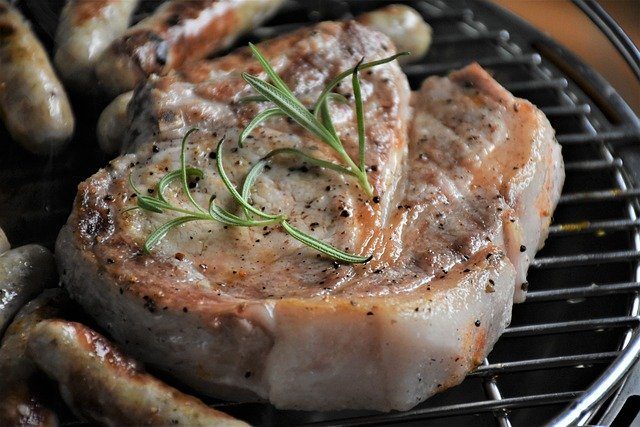
Feeding Pork Safely
So, pork can be healthy for dogs of any age, but this doesn’t mean that you can just feed them a strip of bacon. It should be fed in moderation, and there are certain cuts that need to be avoided, while also ensuring that there are no harmful or unnecessary additives in the food.
Pork Must Be Cooked
Raw pork contains trichinella spiralis larvae. Consumption of this parasite can cause trichinosis, which can lead to serious gastrointestinal illnesses. Although this is less common in dogs than it is in people, it remains a concern. The best way to ensure that your dog does not suffer from this harmful illness is to ensure that any pork you feed your dog is fully cooked before serving.
Start Small
Introducing a new ingredient to your dog’s diet can lead to gastrointestinal complaints, and your dog may even be allergic to pork. It is also quite high in fat. As such, it is best to introduce the meat gradually, and only ever offer it in moderation. Ensure that the meat is cut into small pieces, cook it thoroughly to kill off any bacteria and parasites, and start with a few pieces mixed into their food or a couple of small cubes as a treat. Pork is a rich meat, so your dog may exhibit some gaseousness. If they can handle a few small pieces, you should be safe to feed them this amount a couple of times a week.
Avoid Additives
Avoid feeding your dog any pork sausage or other pork-based foods that contain other additives. This is especially true because these kinds of food tend to contain garlic powder and onion powder. These ingredients are not only dangerous in large quantities but can be dangerous even in very small doses because they are toxic to dogs. Other ingredients that might be included in sausages and other meats are also potentially dangerous. Ensure that you only feed unseasoned pork and that it does not contain any other ingredients or any kind of rub.
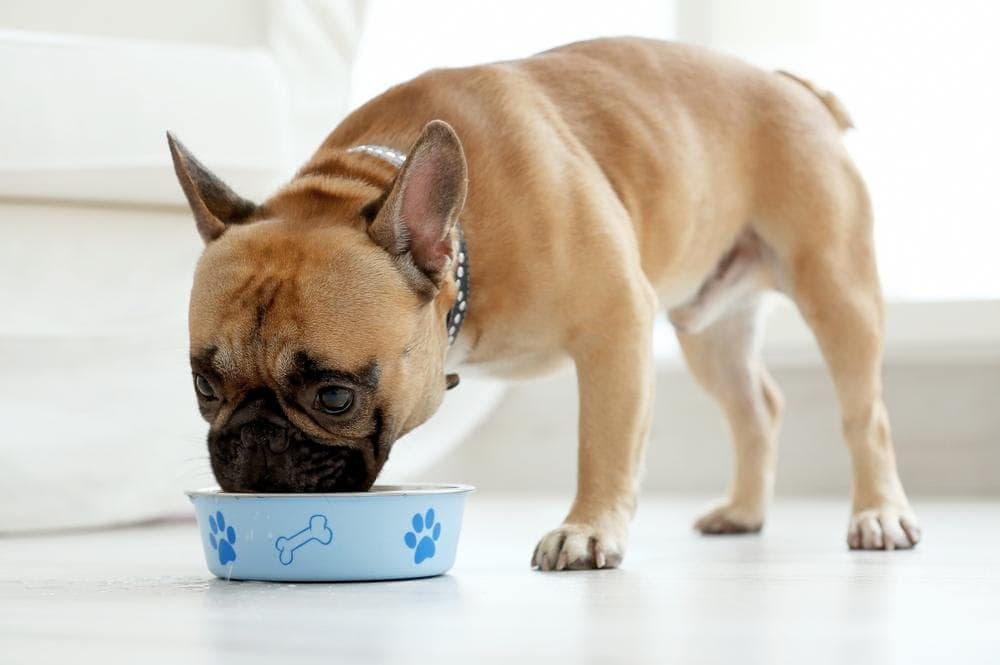
Do Not Feed Processed Food
You should avoid feeding your dog any processed food. It typically has an extremely high salt content, which can lead to serious complications. Too much sodium will leave your dog very thirsty, and it can lead to problems including sodium ion poisoning. Symptoms include vomiting and diarrhea. Eventually, it can also cause seizures and may lead to death if left unchecked. Processed foods can include other ingredients like xylitol, the sweetener, which is also bad for your dog’s health.
Avoid Feeding Bones
The feeding of meat bones to dogs is an emotive area. Some people go a lifetime regularly feeding cooked bones to their dogs without issues. However, there are equally as many reports of bones shattering and splintering and causing serious damage to the esophagus and intestines. The splinters can also cause choking.
Uncooked bones reduce this risk, but there is still some potential danger when feeding bones. If your dog enjoys gnawing on a bone, you can consider a healthy dental bone as a beneficial and safe alternative.
Try to Get Rid of The Fat
Pork is approximately 80% protein and 20% fat, which means that it has higher fat content than most alternatives. The type of fat in pork meat is especially difficult for dogs to digest, too, which is one of the reasons why dogs should not eat bacon or processed ham. It is not only too rich, but they will struggle to digest the fat, and this can lead to gastrointestinal problems and may cause bloat and pancreatitis.
Where possible, choose a less fatty cut of pork and trim off any excess fat that you see before cooking and serving the meat. Even after you’ve removed any visible fat, there will still be some running through the cut of meat, which is a good reason to avoid feeding your dog too much of it in one sitting.
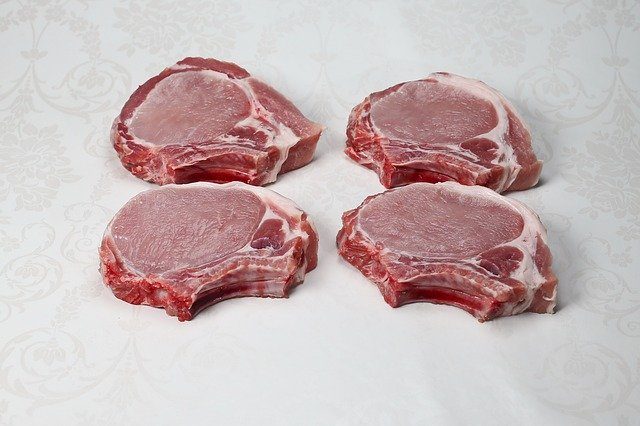
What If Your Dog Has Eaten Pork?
If your dog has stolen a piece of pork from your plate or you’ve unknowingly fed it to them, it’s unlikely to have caused any major problems if it was a one-off. Even if the pork was raw, good quality meat from reputable farms it is unlikely to contain parasites. You may notice that they are thirstier than usual, and they may need an extra walk or an extra trip to the yard. Unless they are showing signs of distress, start vomiting, or show other major symptoms, there’s probably no need to worry. You can call a veterinarian to check that your dog is OK.
On the other hand, if they have eaten processed meat that contains ingredients like onion or garlic, this could be a serious cause for concern because such ingredients are toxic and potentially dangerous even in small quantities. Speak to a vet as soon as possible.
Alternative Foods
Dogs benefit from having animal protein in their diet, and there is no doubt that pork is a good source of this protein. However, it can be salty and it is very rich. As such, a lot of owners prefer to steer clear of this particular food product. If you want to increase the amount of protein in your dog’s diet but do not wish to feed them pork, consider alternatives like chicken. Chicken is easy to digest and it contains a host of vitamins and nutrients, as well as animal protein.
Final Thoughts
In moderation, it is safe for dogs to eat unprocessed and properly cooked pork. However, it is high in fat and can be rich in sodium, so you should avoid feeding too much of this meat. Save it as a treat, use it to help get tablets down, or add a few cubes of it to their meal occasionally. Always avoid feeding processed food, and absolutely avoid pork with additional ingredients, especially toxic ingredients like onion or garlic powder. If you are concerned about feeding pork but want to add more protein to your dog’s diet, you can always cook and add chicken to their meals.
Related Read:
- Can Dogs Eat Pork Rinds? Are Pork Rinds Safe for Dogs?
- Can Dogs Eat Tripe? Vet Reviewed Facts and FAQ
Featured image credit: ludiarin, Pixabay




